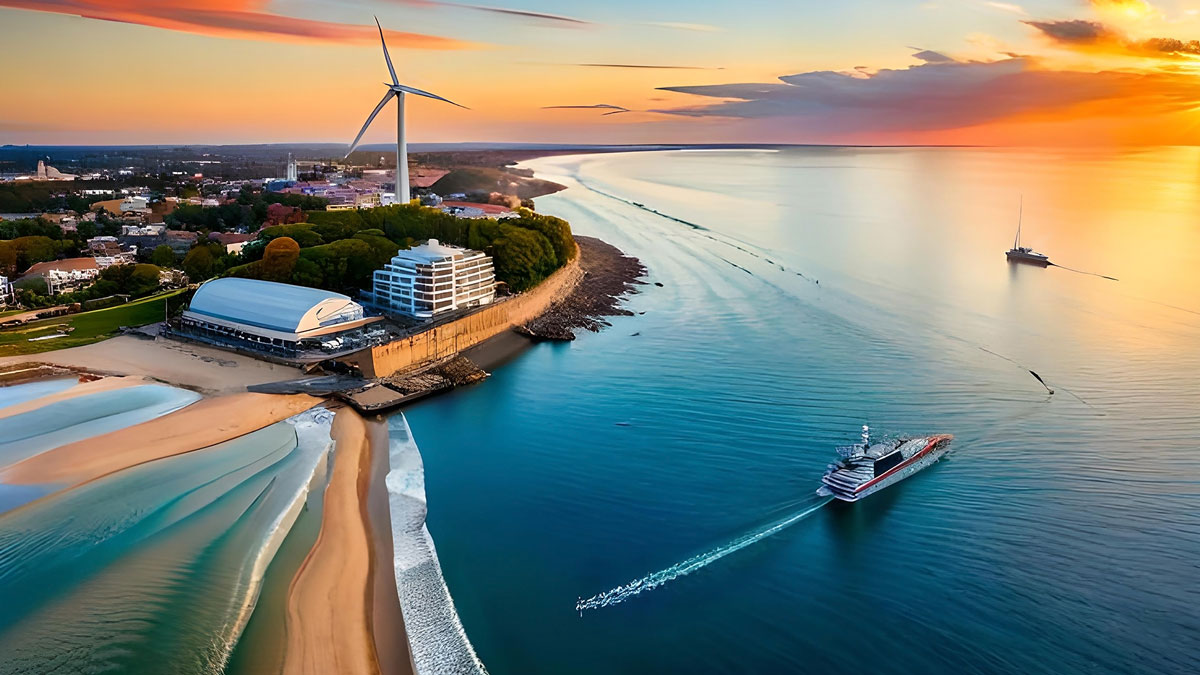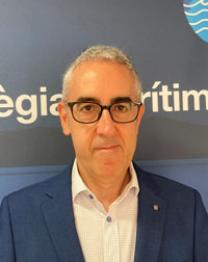United Nations Trade and Development (UNCTAD) and Global Cities Hub noted they co-organized this virtual event on cities’ role in the ocean economy with two aims. First, they sought to strengthen two-way information exchange between speakers, UNCTAD and other organizations, and local and regional governments. Second, they aimed to explore how UNCTAD can help coastal cities and the global community achieve the sustainable development goals (SDGs).
Speakers repeatedly emphasized the scale and urgency of the topic. The global population now lives predominantly in cities, and by 2050 urbanization rates could reach 70 per cent. Of the urban space that will exist in 2050, however, 60 per cent has yet to be built. Rapid development and urbanization can bring advantages and opportunities, such as connectivity, port activities, fisheries, and tourism, with global trade in ocean-based goods and services estimated to be $1.8 trillion in 2022 (UNCTAD Stats, 2024).
However, it can also bring challenges, including unique vulnerabilities to climate change, large demands on infrastructure and services, and significant plastics, greenhouse gas, and chemical pollution. These challenges and opportunities are particularly pronounced for cities in Small Island Developing States (SIDS), which both depend on the ocean for livelihood and are existentially threatened by climate disasters and sea level rise. Major port cities like Shanghai, China, Panama City, Panama, and Alexandria, Egypt—which are now central to the functioning of the global economy—also face substantial threats from climate change. In fact, estimates suggest $18.3 trillion dollars may be needed for global coastal protection by 2100 (Intergovernmental Panel on Climate Change, 2022). As such, the global community has a significant interest in understanding how to urbanize in a sustainable and resilient way.
In exploring the role of local and regional governments in the ocean economy, speakers highlighted several areas where cities have significant roles and the need for a multisectoral, multistakeholder approach. Waste management and pollution control emerged as areas of focus. In these sectors, cities often have exclusive or even primary jurisdiction, and thus may even be more important than national governments in implementation of specific SDGs. According to the UN Environment Programme (UNEP), 47 per cent of municipal plastic waste is poorly disposed of and likely to enter the ocean. Water, water treatment, and sanitation were also identified as areas of significant urban responsibility, and speakers discussed the possible role of desalination in urban ocean economy strategies. While desalination has been critical in helping many Mediterranean and Middle Eastern cities, like Barcelona, Spain, deal with the impacts of droughts, it can cost five times more than other sources and currently serves more as a last resort. Additionally, speakers emphasized the importance of local and regional governments in promoting and regulating tourism and recreation, managing coastal zones, and building local infrastructure.
Speakers also presented several examples of cities and organisations positively handling opportunities and challenges facing the urban ocean economy. For instance, one speaker highlighted the role of USAID’s Clean Cities Blue Ocean Program in helping coastal cities to transition to better waste management and the work of Caribbean Blue Economy Financing Project in offering sustainable financing. Another focused on diverse experiences from Yangzhou, China, in addressing plastic pollution and promoting recycling; Mombasa, Kenya, in implementing urban, port, and coastal waste management efforts; and Copenhagen, Denmark, in cleaning up and transforming its port into a recreation and tourism hub. A third speaker highlighted the role of subnational governments by focusing on Catalonia’s Integrated Maritime Policy (IMP). The IMP aims to focus promote a sustainable blue economy, healthy ecosystems, citizenship that values the sea, and innovative governance.
Finally, speakers emphasized UNCTAD’s important role in helping national, regional, and local governments. They highlighted UNCTAD’s efforts to create dialogue, expand data collection, and identify lessons and best practices. They also considered the possibility of greater efforts to localize and track SDGs, particularly related to the urban-ocean nexus.
Approximately 27% of the global population – equivalent to around 2.15 billion people – resides in coastal cities and the near coastal zone. UN Trade and Development (UNCTAD) estimated the value of the global ocean economy at $2.6 trillion in 2021. Oceans and coastal cities serve as dynamic interfaces where human behavior and urban development, including agricultural and manufacturing systems, intersect with marine ecosystems and climate dynamics.
Webinar Objective
This Geneva Urban Debate (GUD) aims to raise awareness about the relevant activities by UN Trade and Development (UNCTAD) and strengthen two-way information exchange between the organization and Local and Regional Governments (LRGs) on the way for the United Nations Summit of the Future in September 2024 as well as for the United Nations Ocean Conference in 2025. Speakers will explore the multifaceted roles that cities can assume to foster synergistic relationships between human settlements and their coastal environments. Experts will explore in what areas LRGs can contribute to the work of UN Trade and Development to maximize their local impact. Our aim is to explore how UN Trade and Development can help coastal cities help our global community to achieve the Sustainable Development Goals (SDGs).
Background
The vast expanse of oceans and seas around the globe play multifaceted roles: they provide sustenance, harbor minerals, oxygenate the atmosphere, absorb greenhouse gases, influence weather patterns, and serve as vital trade routes, facilitating 80% of international commerce. They sustain livelihoods, employment, nutrition, and drive economic growth in cities and islands.
Most ocean and coastal cities share a symbiotic relationship with the sea. They rely on it for connectivity, trade, sustenance, leisure, tourism, and climate regulation. However, this relationship is not unidirectional. Cities are also a huge source of solid, wastewater, and chemical pollution. Particularly in cities where environmental services such as sewage, pollution control, solid and wastewater management are insufficient to meet the existing and expected demand.
Given their exclusive and shared responsibilities in urban planning, public services, economic development, transport, health, infrastructure, and environmental controls, Local and Regional Governments play a pivotal role. They are called upon to champion sustainable development, aligning their actions with relevant Sustainable Development Goals.
UN Trade and Development (UNCTAD) is exploring how the vulnerabilities of coastal cities and regions, such as climate change, sea-level rise, and natural disasters can affect their trade and development prospects. In cooperation with other UN agencies, academia, and civil society actors it promotes sustainable urban development strategies tailored to the unique needs of coastal cities. This includes integrating sustainable ocean or blue economy considerations, promoting green and resilient infrastructure, and fostering inclusive growth to mitigate the adverse effects of urbanization on coastal ecosystems.
UN Trade and Development (UNCTAD) provides, at their requests, policy recommendations to governments – and sometimes to local and regional authorities – to address the challenges faced by coastal cities effectively. These recommendations encompass trade regulatory frameworks, land and ocean space planning, economic diversification, disaster preparedness, and capacity building initiatives aimed at fostering sustainable development along coastal areas.
The Geneva Urban Debate connects Local and Regional Governments and international organizations to advance inclusive multilateralism and make intergovernmental decision-making more effective by integrating voices of local authorities. We believe that UN Trade and Development’s work might benefit by bringing the experiences and needs of local and regional communities into the debate.
Tentative Programme
Moderator: Mr. Andras Szorenyi, Senior Policy Advisor, Global Cities Hub
Setting the scene: Mr. Graham Alabaster, Head of UN-Habitat Geneva Office
Speakers
- H.E. Mr. José R Sánchez-Fung, Ambassador, Permanent Representative, Permanent Mission of the Dominican Republic to the World Trade Organization and UNCTAD, Geneva
- Mr. David Vivas Eugui, Chief of Section, Ocean and Circular Economy, UN Trade and Development (UNCTAD)
- Mr. Awni Behnam, Honorary President, International Ocean Institute (IOI), Malta
- Mr. Sergi Tudela, Director General for Maritime Policy and Sustainable Fisheries, Generalitat de Catalunya
Q&A
José R. Sanchez-Fung is the Dominican Republic’s ambassador and permanent representative to the World Trade Organization (WTO) and to the United Nations Conference on Trade and Development (UNCTAD) in Geneva, Switzerland. He is currently serving as the chairperson of the WTO’s Committee on Budget, Finance and Administration, chairperson of the Working Party on the Accession of Equatorial Guinea to the WTO, coordinator of the 39-country SIDS Group at UNCTAD, and vice-president of UNCTAD’s Trade and Development Board.
Preceding the appointment in Geneva, Dr Sánchez-Fung was ambassador extraordinary and plenipotentiary, and head of the diplomatic mission, of the Dominican Republic to Switzerland, based in Bern. He was also ambassador and permanent representative of the Dominican Republic to the Universal Postal Union.
Before joining his country’s foreign service, Dr Sánchez-Fung taught economics for over two decades at the University of Nottingham (Ningbo, China), Kingston University London (with tenure), and the University of Kent (Canterbury, UK). He currently holds an adjunct professorship at Western Michigan University’s department of economics (Michigan, USA).
Ambassador Sánchez-Fung holds an undergraduate degree in economics from PUCMM in Santo Domingo, and MA and PhD degrees in economics from the University of Kent in the United Kingdom.
David Vivas Eugui is Chief (a.i) of the Trade, Environment and Sustainable Development Branch at UNCTAD.
Previously, he was a Senior Economic Affairs Officer in UNCTAD’s Trade Negotiations and Commercial Diplomacy Branch, Deputy Programmes Director at the International Centre for Trade and Sustainable Development (ICTSD), Senior Attorney at the Center for International Environmental Law (CIEL), Attaché for Legal Affairs at the Mission of Venezuela to the World Trade Organization (WTO) and Staff Attorney at the Venezuelan Institute of Foreign Trade. David is an international expert with more than 20 years of experience on legal and economic issues.
He has worked as an advisor and consultant for various institutions, international and national organizations and has lectured on intellectual property, trade, oceans economy and environmental law at the University of Strasbourg (CEIPI), Universidad de Buenos Aires (Argentina), Universidad Javeriana (Colombia), Maastricht University (the Netherlands), WIPO Distant Learning Academy, and University of Business and International Studies (Switzerland).
He holds a JD from the Universidad Catolica Andres Bello, an LLM from Georgetown University and a Master in Transnational Business from the Universidad Externado de Colombia.
A former United Nations diplomat with 27 years of experience in the diplomatic service. He served on request as Secretary of the Ministerial meetings of the G77 prior to UNCTAD in Tehran, Havana, Morocco, South Africa and as Secretary of the G77 regional meetings in Bangladesh, Jordan, Lebanon.
He assisted and advised the Government of Qatar in organizing the South Summit in Doha, 2004, and other countless events including the GATES conference in Shanghai and GPA in Beijing.
He has BA in business administration from Mustensiriya University (1968) and a Msc and PhD at the University of Wales (1972-76).
Dr Graham Alabaster is a public health engineer by profession and is UN-Habitat’s Director of the Geneva office, where he represents the Executive Director of UN-Habitat. He is responsible for liaison with Geneva-based member states missions and international organisations.
After an early career in academic research in the UK and Africa, and a period in industry, he joined UN-Habitat in 1992. Since then, he has looked after many different portfolios including: Slum upgrading, environmental infrastructure; health and environment; Water, Sanitation and waste management. In addition, he has been responsible for developing relationships with the regional development banks and the private sector. During this period, he has been on secondment to both the World Health Organisation (WHO), and UNHCR, where he has applied his expertise to preventative health in urban settings and humanitarian environments. The work has usually included both policy advice to members states and project design and implementation.
He was responsible for the development of the UN-system wide monitoring mechanism for SDG 6 on Water, and also the co-custodian of indicator 6.3.1 on wastewater. He is currently the co-chair of the RBM End Malaria Now, Multi-sectoral working group, and is a Lancet Commissioner for the build-out of Aedes-borne diseases in cities. In addition, he represents UN-Habitat on many inter-agency bodies and advisory groups. He has also produced a variety of publications including global reports and technical papers in journals.
He has over 35 years- experience in the urban sector and has worked in over 50 countries in all regions of the world. He holds a BSc (Hons.) in Chemical Engineering and a PhD in Civil Engineering.
András Szorényi joined the Global Cities Hub after 20 years of distinguished diplomatic career. He worked in different capacities in Brussels, covering EU affairs, Washington D.C. dealing with bilateral relations and in Geneva, working with the United Nations and other International Organizations. He has first-hand experience of negotiating in the European Union and the UN system as well as conceptualizing and implementing diplomatic initiatives on a wide variety of issues.
With a deep knowledge of international relations, he always focuses on new global developments and emerging challenges. He has a broad understanding of the engagement of non-state actors on multi-stakeholder platforms. He has been particularly interested in the increasing influence of non-state actors on the development of international relations since his Ph.D. research.
Dr. Szorényi holds a Ph.D. in International Economics from Corvinus University, a DEA in Comparative Political Sciences from Sciences Po Paris and a Master degree in International Relations from the University of Economics in Budapest.
Dr Sergi Tudela i Casanovas (Barcelona, 1969) holds a Ph.D. on fisheries ecology from the University of Girona and two M.Scs. in biology and applied oceanology from the University of Barcelona and the University of Perpignan, respectively.
After working for 8 years as a scientist at the Spanish National Research Council, Dr Tudela moved to the WWF, where he spent 15 years as head of its fisheries programme for the Mediterranean region. Dr Tudela has authored dozens of scientific papers and some books on fisheries and marine issues and has contributed expertise to international organisations, including the FAO. He has been honoured with the WWF Award for Conservation Merit (2013) and the Catalan Fisheries Award (2015).
In January 2016 he was appointed Director-General for Maritime Policy and Sustainable Fisheries with the Government of Catalonia.
Related
Topic
Trade and environmentProgramme
Project
Contact
Andras Szorenyi, Global Cities Hub, [email protected]
David Vivas Eugui, UN Trade and Development, [email protected]








